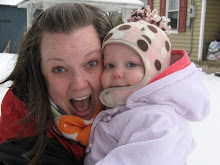Everything went fine today. It was a long day but nothing exciting happened (thats the way we like it). They eye exam actually wasn't that bad but the dilating of the pupils wasn't Alivia's favorite part (the drops sting) and her eyes will be dilated for a day or two. Crazy. We had her wear sunglasses all day to try to help. She looked super cute as always.
I wanted to share the treatment plan that we were given by the doctors. It is long and complicated but I thought if I just copy it word for word people would understand all the process a little better. So here goes.
"Your child was diagnosed with amyeloproliferative disorder.
Treatment plan.
Before your child undergoes a bone marrow transplant, many tests are done to assess your child's general health. These include functional tests of the heart (EKG and Echo), kidneys, liver, lungs, eye, hearing tests and blood tests to look for viruses. Your child must be free of any active infection before the transplant.
If these tests indicate that your chile's health is satisfactory for transplant, then he or she will be admitted to a private room ont he ONcology Unit. The preparation for transplant consists of two chemo drugs, busulfan and cyclophosphamide given over eight days. Busulfan is given by IV for times a day for four days. Cyclophosphamide is given by IV once a day for four days. The Ninth day is one of rest. On the tenth day the stem cells are given to your child through the central venous line.
Busulfan and cyclophosphamide both cause nausea, vomiting, hari loss, mouth sores, diarrhea and sterility. To prevent nausea and vomiting, we give the medicines that have worked best for your child in the past. Both drugs can cause seizures. We try to prevent seizures with the anit-sezure medicine dilantin. Both of these medications have a potential risk of causing acute myeloid leukemia. We estimate this risk to be about 5%. WE cannot prevent secondary leukemia, but we recognize thast the risk of death from secondary AML is substantially less than the risk od death from the leukemia your child has now.
In addition, busulfan can cause lung scarring. To prevent these complications from busulfan, we will obtain levels (blood draws) and adjust the dose to hopefully avoid excessive toxicity. Cyclophosphamide causes fluid retention and bleeding from the bladder which we attempt to prevent with the medicine called MESNA< a drug which combines with the breakdown products of cyclophosphamide in the bladder. Rarely, cyclophosphamide can cause heart damage.
Other risks of the bone marrow transplant include:
1. Infection. the immune system will be depressed for a vriable period of time, and the white blood cells that fight infeciton will be lacking until the graft "takes". Your child will receive intravenous gammaglobulin prior to the transplant and then monthly to help decrease the possibility of a serious viral infection. If your child should have a fever, IV antibiotics would be started. Usually, we are successful in treating the infecting with antibiotics, but infections can be life-threatening.
2. Bleeding, as the platelets which help blood clot may be low. Usually we are succesful in preventing major bleeding problems with tranfusion of platelets.
3. Venous Occlusive Disease (VOD): this can occure as a result of the chmoe. Symptoms include jaundice, with liver dysfuncthin, weight gain, and extra fluid in the abdominal cavity. It may often be managed successfully, and completely resolve. However, complications may arise that can be fatal.
4. Mucositis and diarrhea: the large dose of medicines cause erosioin in the lining of the mouth and intestines. THis can result in painful mouth sores and diarrhea. Pain medicine is genearlly required when mucosistis is severe. Mucositis gets better when the white blood count starts to rise and engraftment occurs.
5. Graft vs host disease (I wrote all about this on the other site so I am skipping this section)
6. Graft rejection: This may happen early or sometimes, the graft will be rejected after an initial period of acceptance. Graft rejection can be determeined by a bone marrow test. If this occurs another transplant is sometimes possible. As the preparation with high dose chemo will destroy your child's bone marrow, your child will not be able to make red blood cells, white blood cells, or platelets. There would be a greater risk of bleeding or infection.
7. Second Cancers. There is a very small risk of second cancers foloowing a bone marrow tranplant. This risk is felt to be outweighed by the risk of you child dying from complications of his/her primary disease.
8. Other late effects: bone marrow tranplantation may cause delayed damage to the heart, lungs, brain, liver, kidney, bones and ovaries."
See all the things my God is going to overcome? Won't we be so amazed by His goodness and might. I am excited for the day when I can look around and say "look at how far we have been carried"
 I am a mom of a cutie pie (very biased). And I wanted to share my experiences with others (including my cuties grandparents, great-grandparents, numerous uncles and other relatives). I love being a mom and can't imagine doing anything else.
I am a mom of a cutie pie (very biased). And I wanted to share my experiences with others (including my cuties grandparents, great-grandparents, numerous uncles and other relatives). I love being a mom and can't imagine doing anything else.








